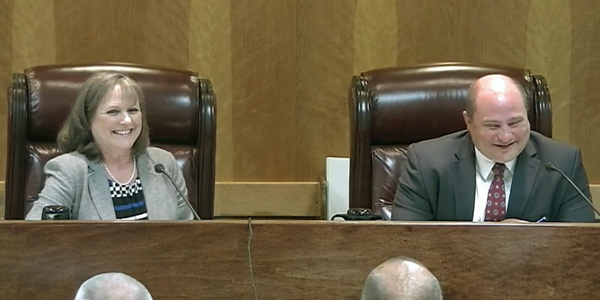The Public Utility Commission of Texas on Thursday delayed its final approval of Southwestern Public Service’s request to build a 478-MW wind farm in West Texas, allowing the company and other parties in the docket time to provide written answers to the regulators’ latest questions and recommend further revisions to the draft order (46936).
SPS said it could make a reply filing on May 16, clearing the way for the PUC’s final approval during its May 25 open meeting.
The commission had verbally approved SPS’ request during its April 27 meeting, promising a final approval this week. (See Texas Commissioners Approve 478-MW SPS Wind Farm.)
PUC Chair DeAnn Walker apologized for the two-week delay, saying she developed the questions as she reviewed the proposed order.
“I fully intended to get it done today,” she said. “If anything should be clear to anyone in this industry, it’s that I need to be comfortable with what I sign.”
The wind farm is part of a 1.23-GW project by SPS parent Xcel Energy that will provide renewable energy to SPS customers in Texas and New Mexico. The utility says the project will save its retail customers about $1.6 billion in energy costs over its 30-year life.
PUC staff filed a draft order on May 9 that revised its previous version, eliminating provisions rendered moot by a settlement reached in March between SPS and staff, the Department of Energy, the Office of Public Utility Counsel (OPUC) and seven other consumer groups, area cooperatives and landowners.
Walker filed a memo that same day outlining her concerns about SPS’ exceptions to the latest order. She said some rate-related findings suggested in the order would be more appropriately made in a future rate proceeding, and that some sections of the order “lack the clarity” necessary for inclusion in a PUC filing.
She focused much of her discussion on the order’s proposal to recover costs by flowing production tax credits through fuel, asking the parties to explain why the commission should deviate from its “well-established principles” of matching costs and benefits.
“The benefit of production tax credits flowing through fuel accrues to some customer classes more than the costs those same customers bear through their base rates,” Walker wrote. “Conversely, customers who bear more of the costs in their base rates receive less of the benefits, because they flow through fuel. This does not meet the commission’s typical matching principle.”
Attorney Rex VanMiddlesworth, representing Texas Industrial Energy Consumers, said the PTCs should flow through fuel as they are earned, pointing out that they are used when bidding into the markets.
“You’ve got to have those PTCs going through fuel, otherwise the fuel costs won’t reflect the actual [bid] … into the LMPs. You would be bidding in at -$28, and the customers wouldn’t be getting that -$28,” VanMiddlesworth said. “PTCs are kind of a classic energy allocation. When we have a rate case, if it’s litigated, I wouldn’t be surprised to say at least part of the PTC ought to be allocated on an energy basis.”
SPS President David Hudson reminded the commission that the utility has said the wind farm will be an energy resource, rather than a capacity resource.
“Our intention all along is to allocate the base rate case cost on energy,” Hudson said. “It’s going to be consistent with how the fuel goes back and the PTCs go back. Everything is going to be synchronized. It’s just some parties thought there might be a capacity addition in the future.”
“We’ve never had a plant like this. Every other plant we had was to meet demand,” he said.
VanMiddlesworth said the SPS facility is being built “largely because of PTCs,” which make it profitable over the first 10 years.
“You have your decision then, we have our rights to address it at that time,” he said. “We don’t foresee it as a problem. We do want the ratepayers to get the PTCs as they’re earned.”
Rayburn Country Picks 44.6 Miles of Trinity Valley Assets
The commission also approved the transfer of certificate of convenience and necessity rights for 44.6 miles of existing 138-kV transmission lines in East Texas from Trinity Valley Electric Cooperative to Rayburn Country Electric Cooperative (Docket No. 47951).
Rayburn already owns or leases more than 360 miles of 138-kV lines that serve wholesale loads in both ERCOT and SPP. The transferred facilities are operated in ERCOT.
— Tom Kleckner







